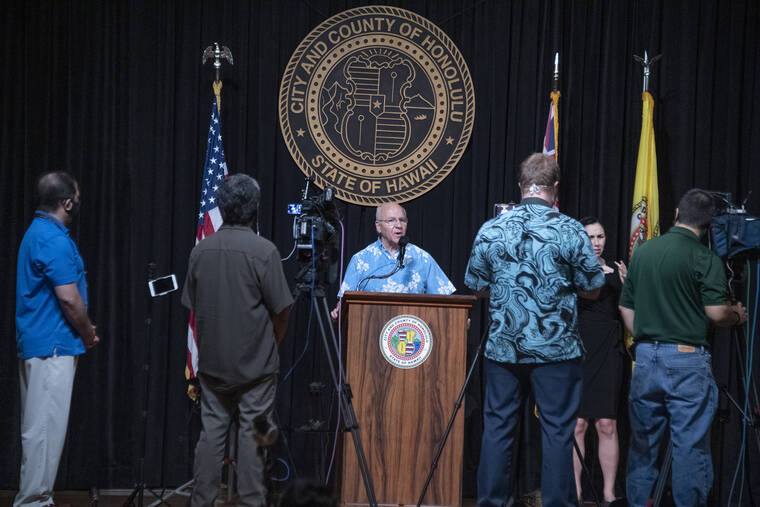In the face of the rapidly spreading omicron variant and rising hospitalization rates, Honolulu Mayor Rick Blangiardi on Wednesday took a step he had previously resisted: He reimposed some COVID-19 restrictions.
The restrictions are very limited — they cap large indoor gatherings of more than 1,000 people to 50% capacity, for three weeks — but it’s a welcome start, albeit a belated one.
Omicron first surfaced in Hawaii on Dec. 2, just one day after Blangiardi opened up large events and gyms to full capacity. Since then, case counts and positivity rates have soared, and hospitalization rates are climbing.
Blangiardi continues to emphasize personal responsibility coupled with programs already in place, like Safe Access Oahu, as key tools to combat the virus. He praised individuals and businesses for taking precautions.
“These efforts at protecting ourselves and each other will help us get through this omicron surge,” he said.
He’s right about that. Voluntary measures will help, and they are absolutely necessary. But they may not be enough.
Like Blangiardi, the health care experts advising him have rightly emphasized the critical importance of getting booster shots to strengthen the waning efficacy of the COVID-19 vaccines. As of Friday, only 384,363 people had received that third shot. That number needs to grow, fast. Health care providers, from hospitals to supermarket pharmacies, should make it as easy as possible to get the booster. Expanding walk-in access and reducing paperwork hassles would help.
But some forecasts said that the highly contagious omicron, while appearing milder than the delta variant, spreads so fast that increased hospitalizations seem all but inevitable. And with a shortage of hospital staff and the heavier burden of caring for a patient with COVID, Oahu’s health care system could be facing trouble.
Rather than complaining about the media’s “shock and awe” emphasis on case counts, the mayor could seize the moment to be a more proactive leader.
Blangiardi rightly wants to avoid another major business lockdown, especially in the absence of more federal help. But he could lay out further restrictions he could adopt, if necessary, so businesses and the public will know what to expect.
His administration also could put additional effort into spreading the get-your-booster gospel, not only through traditional media, but with a more robust, high-profile program of direct outreach to vulnerable communities — actively engaging community leaders and organizations to spread the word, and providing more resources to connect people with shots.

